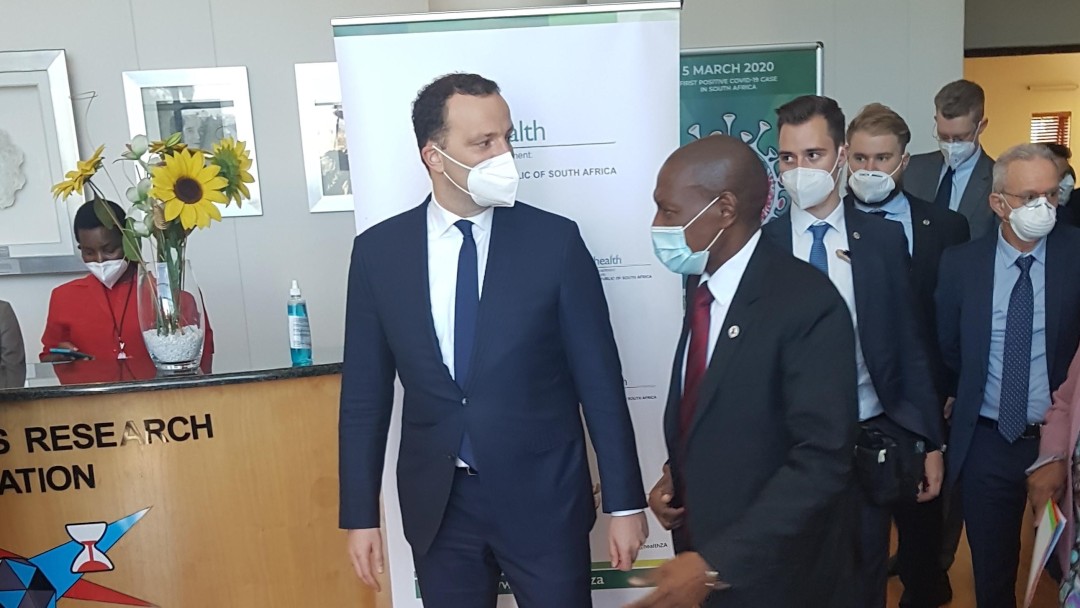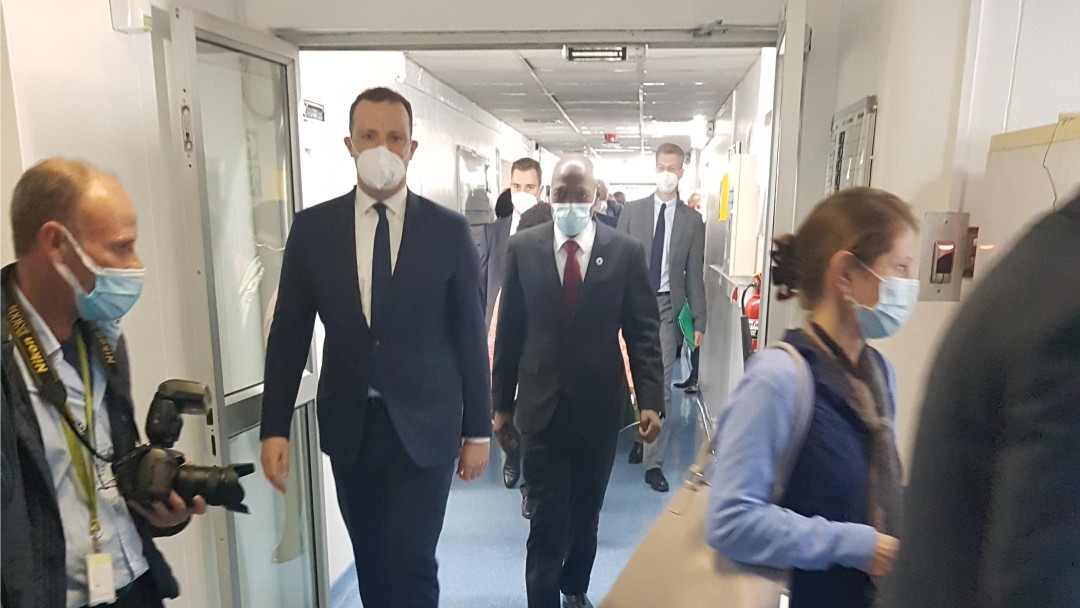News from 2021-05-31 / KfW Development Bank
South Africa: Health Minister Spahn hands over testing equipment
How Germany is helping in the pandemic

During a visit to South Africa, Health Minister Jens Spahn and French President Emmanuel Macron reaffirmed their support in coping with the COVID 19 pandemic. KfW has provided EUR 11.6 million for this purpose on behalf of the Federal Government, including EUR 3 million for the South African Ministry of Health to procure protective clothing and equipment for the national reference laboratory.
Federal Minister Jens Spahn inspected the newly installed laboratory equipment at the National Institute for Communicable Diseases (NICD) in Johannesburg. Together with the South African Minister of Health Zweli Mkhize, he symbolically put a large-scale analytical unit for molecular diagnostics into operation. KfW financed a total of 27 units for the institute, which were immediately integrated into the daily routine of the laboratory.
Germany had already committed assistance to South Africa a few weeks after the appearance of the first Corona cases in the country. Initially, support to contain the pandemic was integrated into an ongoing HIV/AIDS programme, which ensured rapid implementation. More than EUR 3 million were provided, mainly to effectively protect health workers from COVID 19 infections and to strengthen the capacity of the national reference laboratory.
Shortly after the outbreak of the pandemic in South Africa, Germany procured protective equipment for the nursing staff. Around 400,000 masks, more than 150,000 gloves as well as disinfectants, protective clothing and goggles and contactless thermometers were handed over to central distribution points in Johannesburg and the Eastern Cape. The equipment not only serves to protect the nursing staff but also increases their willingness to work in the health system.

Strengthening resilience
"The quick and unbureaucratic assistance in 2020 has shown the solidarity of the two countries and directly reduced the risk of infection for medical staff at a time when protective clothing was limited," says Almut Ahlers, Deputy KfW Office Director in Pretoria. "In the future, building up its own vaccine production will also strengthen resilience to epidemics and help the continent overcome African challenges."
KfW also financed laboratory equipment for the national reference laboratory NICD in Johannesburg on behalf of the German Federal Government. The new equipment comprehensively expands the existing testing capacities and enables the institute to conduct enhanced analyses on the spread of the SARS-CoV-2 virus in South Africa and thus contribute to the investigation of the pandemic.
The German-funded analyser can process up to 1056 samples in just eight hours and test for multiple pathogens simultaneously. This large-scale automated molecular diagnostic instrument can be operated in a few simple steps, freeing up scarce human resources for more demanding laboratory work. Once the pandemic is contained, the laboratory equipment can be used for the diagnosis and research of a variety of other pathogens of transmissible diseases.
In the afternoon, at the invitation of President Macron, Jens Spahn attended the launch of the Future Africa Initiative to promote local vaccine production together with South African President Ramaphosa and several of the country's ministers. In his speech, Minister Spahn emphasised the need to build up Africa's own capacities for the production of COVID 19 vaccines and pledged financial resources from the German Federal Government for this purpose. "Together with the EU, we want to contribute to the establishment of production facilities so that the whole of Africa can benefit from domestic products and technologies that are safe and innovative," he emphasised at the meeting, which took place in a friendly and very constructive atmosphere. The South African partners in particular took the opportunity to present their scientific work at a high professional level, for example through extensive studies on the South African mutant B 1.351 and on the effectiveness of the mRNA vaccines. So the signs are good for getting the coronavirus under control on site through locally produced vaccines.

Share page
To share the content of this page with your network, click on one of the icons below.
Note on data protection: When you share content, your personal data is transferred to the selected network.
Data protection
Alternatively, you can also copy the short link: https://www.kfw-entwicklungsbank.de/s/enzBWrMC.CfuA
Copy link Link copied